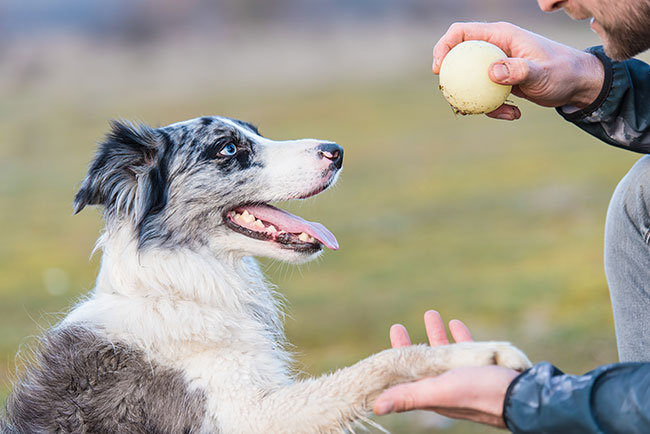
Between Alarms: A leadership lesson from my dog
Arjuna George
Features Hot Topics Leadership Arjuna George editors pick Positive reinforcement is more effective than discipline or aggression. Photo: name SasaStock/adobe stock
Positive reinforcement is more effective than discipline or aggression. Photo: name SasaStock/adobe stock There is no better time than between alarms to improve yourself and those around you. This month’s column focuses on leadership with a twist. As I write this, my new puppy Murphy, turns one.
Over the past year I have reflected on raising a puppy and how it relates to working in teams, coaching and leading firefighters. Please join me on this journey of raising a puppy and how the many skills cross over into the fire service.
Starting on day one —with a new dog or a new firefighter— one must be ready to put in the time to coach, train and help them reach their maximum potential. Our role as a leader or a mentor is just that: to make others around us better.
We must be ready and committed to show others the behaviours expected. This can take time, patience and continued practice. Reinforcing our expectations sometimes requires redirection. Positive reinforcement is more effective than discipline and aggression.
When coaching your fellow firefighters, keep it positive but always honest and constructive. Remember, our aim is to make them better! There is a time and a place for discipline (a very much needed part of growth) but ensure you are doing it with tact and being respectful while providing clear direction for improvement. Your job is to stay emotionally composed and help adjust behaviours. Praise them for good work at every opportunity. Be specific and be timely. This will help build their confidence and reaffirm their progress.
The ultimate motivation killer comes from those that feel they must micromanage. Micromanaging easily takes away enthusiasm, makes the individual feel inferior and halts growth and development. Give your trainee space. Provide the tools and resources to allow them to make decisions, make mistakes and learn from them. Provide clear direction, but leave them free to work their magic. When mistakes happen—and they inevitably will— provide support, encouragement and help them correct their performance.
Body language is the most important and influential nonverbal communication tool you have. Create a positive experience by maintaining an open, approachable and engaged composure. Also use consistent verbal language. If one week we call a fire ground tactic or tool by one term and then next time we mention it, we use a completely different one, this is extremely confusing for anyone.
Anyone who has raised a puppy knows that repetition and small nugget-sized learning opportunities are the secret formula to success. Sounds awfully familiar to training a firefighter, doesn’t it? Our core fundamental competences are all based on small skills, built on one another and repeated until we reach mastery. When you are instructing or coaching, consider breaking it down into little bite-size pieces and see how proficiencies dramatically improve. Once skills become proficient, ensure continual growth by applying new challenges. No one wants to be bored with the same old thing.Challenge your trainees daily.
Fire fighting is serious business. We put our lives on the line every day, but we are also human and like to work in an environment that is fun, exciting and safe. Of course, there is a time to be serious but we must also build a culture of play. This can be a simple kitchen table chat, team sports for health and fitness, or going for hikes as a crew. These elements bring a deeper sense of team and joy to your life which spills over into your job.
The mental and physical well-being of our team falls on each and everyone of us. We must be healthy in body, mind and spirit to be able to help others and be our best self. One thing that really impresses me, is how most animals, including dogs, live in the moment and do not hang on to stress like humans. Even if you are not a dog person, petting a dog helps you calm down. There is a reason why therapy dogs are in such demand and are so effective in supporting people suffering from traumatic stress injuries. They love unconditionally, relieve stress, are always happy and always have your back.
The last point is one of the most important factors to note: food motivates. When food is offered at fire training nights, or when you sit down for a crew meal, a bond is built, barriers are removed and connection is supported. If you are ever faced with a difficult conversation scenario, ensure there is a snack, some light food to help set the stage for a more civil discussion. This helps in a psychological way that often helps defuse the tension slightly.
Next time you are between alarms, consider the leadership lessons learnt from those we lead.
Arjuna George is chief of Salt Spring Island Fire Rescue in B.C. He has served on the department since 1997. Contact Arjuna at ageorge@saltspringfire.com.
Print this page